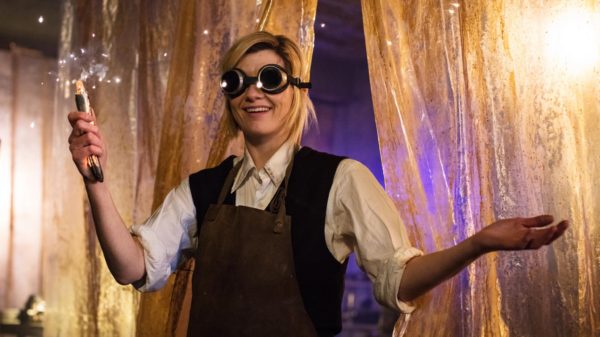No spoilers! Jodie Whittaker makes her debut as the Doctor in The Woman Who Fell To Earth. Here’s what we thought…
Whilst understandably an awful lot of the focus in the build-up to Doctor Who series 11 has focused on Jodie Whittaker taking on the lead role, there’s another dramatic change behind the scenes that’s shaping the new era of the show. That’d be Chris Chibnall, taking over from Steven Moffat as lead writer and showrunner. Chibnall has already in many ways put his stamp on the show. He’s cast the new Doctor, he’s brought in a new bunch of companions, and he’s changed an awful lot of personnel behind the scenes too. As it happens, for lots of people, The Woman Who Fell To Earth is their first big Doctor Who outing.
And it’s very clear from the opening that things are different. Chibnall’s Doctor Who – and he writes this opening episode – is immediately slower. Whilst we’ve got used to fast-paced energetic Who openings in recent years – and that’s no criticism – it’s clear from the off that there’s an intent to go a different way. It takes a while, in fact, for the Doctor herself to appear, as instead, Chibnall goes through the other prominent new additions to the cast, introduces them to us, and begins to knit them all together. Without spoiling anything – and this is a very spoiler-free review, however it may read – it means that a lot is established by the time the more traditional elements of Doctor Who take hold.
Centred very deliberately in Sheffield, The Woman Who Fell To Earth feels more like the establishing episode of a quality TV drama for large parts. It soaks up the geography of the area, deliberately focuses much of its action and drama outside, and has several character mechanics established and in place. It certainly doesn’t feel too much like recent Who. It’s far more chronological, quieter, and less quick than recent times. Furthermore, the core cast mechanic – Bradley Walsh, Tosin Cole and Mandip Gill, along with Whittaker herself – feel like an 80s movie gang rather than a Doctor and her companions. There’s the sense of a bunch of broken people going on an adventure together.
In fact, there’s something that’s handled very early in the opening episode around one of those characters that just deserves flat out applause. Something one of the characters is up against that’s handled so well, feels so important, without ever feeling like it’s there for the sake of it. Personally, I just want to shake Chris Chibnall’s hand for it.
This is, still, very much Doctor Who. There’s a good monster, there’s reworked music that has a familiar foundation, there’s a sci-fi plot and there are some good jumps too (Jamie Childs directs this one, and very, very well). It’s unlikely to be the familiar Who stuff you end up taking away though, as fun as it is. Rather that the show has very clearly evolved, and smartly so.
And then, of course, there’s Jodie Whittaker. It barely takes her a second to drop into the role and make it feel like it’s been hers for ages. She’s such a screen presence: warm, funny, action-packed and quietly energetic. To that bizarre subset of people willing her to fail: tough. She’s great. Really great. I can’t wait to see where she takes the role. Already, it feels as though Doctor Who is lucky to have her.
Change doesn’t win everyone over, and it does feel as though The Woman Who Fell To Earth is more a jumping on point for new viewers than any episode since The Eleventh Hour than something actively going out of its way for more traditional fans. It’s not deep in references, it’s not steeped in classic Who.
What it is, though, is an hour of a new direction, and thus far, a really confident and impressive one. It screens on Sunday October 7th. It’s worth the wait.

